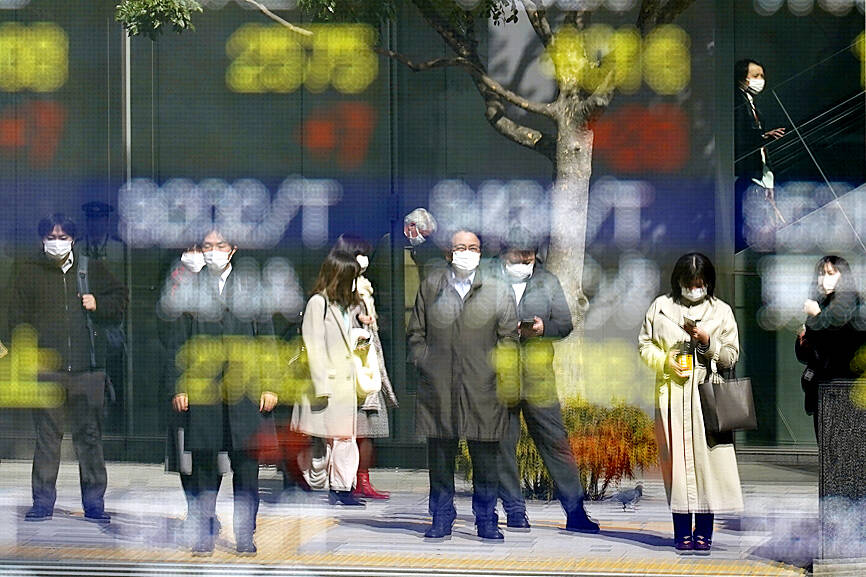Asian stock markets on Friday followed Wall Street higher after a US Federal Reserve official raised hopes the US central bank might not step up its anti-inflation fight as much as feared.
Taipei, Hong Kong, Shanghai, Sydney and Tokyo advanced.
Wall Street on Thursday rose for the first time in three days after Atlanta Fed President Raphael Bostic expressed support for raising the Fed’s key lending rate less than many investors had been forecasting.

Photo: AP
Bostic said that the Fed might be able to suspend additional rate increases by mid-year, sooner than some expect.
He said he supported raising the Fed’s benchmark lending rate to a range of 5 to 5.25 percent.
That countered comments by other Fed officials who say rates might have to be raised more and stay elevated longer to extinguish inflation after job growth, consumer spending and price increases were stronger than expected.
Stocks advanced following those “dovish comments,” Anderson Alves of ActivTrades said in a report.
In Taipei, the TAIEX on Friday closed up 9.7 points, or 0.06 percent, at 15,608.42, up 0.67 percent from a week earlier.
The Shanghai Composite Index rose 17.74 points, or 0.5 percent, to close at 3,328.39, up 1.87 percent for the week, after a central bank official said that China’s vast real-estate industry was recovering from a slump triggered by debt controls that led to a wave of defaults by developers, rattling global financial markets.
People’s Bank of China Deputy Governor Pan Gongsheng (潘功勝) mentioned Evergrande Group, the global real-estate industry’s most heavily indebted developer, but he gave no update on government-supervised efforts to restructure its US$310 billion in debt.
China is today to begin its annual legislative session, where leaders are expected to affirm policies meant to spur economic growth after a slowdown worsened by COVID-19.
The Nikkei 225 in Tokyo gained 1.6 percent to 27,934.01 after Japan’s unemployment rate edged lower in January. It was up 1.73 percent weekly. The broader TOPIX gained 1.25 percent to 2,019.52, rising 1.57 percent from the previous week.
The KOSPI in Seoul gained less than 0.17 percent to 2,432.07, up 0.35 percent weekly, while the Hang Seng in Hong Kong gained 0.68 percent to 20,567.54, up 2.79 percent from last week.
Sydney’s S&P/ASX 200 added 28.2 points, or 0.39 percent, to 7,283.6, down 0.32 percent for the week, while India’s SENSEX rose 1.53 percent to 59,808.97, rising 0.58 percent weekly.
Bostic’s remark countered comments by other Fed officials who said rates might have to be raised more and stay elevated longer to extinguish stubborn inflation after job growth, consumer spending and price rises were stronger than expected.
Data on Thursday showed that fewer Americans applied for unemployment benefits last week despite interest rate hikes to cool business activity. That is positive for workers, but the Fed said it worries strong employment might fuel inflation.
Additional reporting by staff writer, with CNA

Taiwan Semiconductor Manufacturing Co (TSMC, 台積電) last week recorded an increase in the number of shareholders to the highest in almost eight months, despite its share price falling 3.38 percent from the previous week, Taiwan Stock Exchange data released on Saturday showed. As of Friday, TSMC had 1.88 million shareholders, the most since the week of April 25 and an increase of 31,870 from the previous week, the data showed. The number of shareholders jumped despite a drop of NT$50 (US$1.59), or 3.38 percent, in TSMC’s share price from a week earlier to NT$1,430, as investors took profits from their earlier gains

In a high-security Shenzhen laboratory, Chinese scientists have built what Washington has spent years trying to prevent: a prototype of a machine capable of producing the cutting-edge semiconductor chips that power artificial intelligence (AI), smartphones and weapons central to Western military dominance, Reuters has learned. Completed early this year and undergoing testing, the prototype fills nearly an entire factory floor. It was built by a team of former engineers from Dutch semiconductor giant ASML who reverse-engineered the company’s extreme ultraviolet lithography (EUV) machines, according to two people with knowledge of the project. EUV machines sit at the heart of a technological Cold

TAIWAN VALUE CHAIN: Foxtron is to fully own Luxgen following the transaction and it plans to launch a new electric model, the Foxtron Bria, in Taiwan next year Yulon Motor Co (裕隆汽車) yesterday said that its board of directors approved the disposal of its electric vehicle (EV) unit, Luxgen Motor Co (納智捷汽車), to Foxtron Vehicle Technologies Co (鴻華先進) for NT$787.6 million (US$24.98 million). Foxtron, a half-half joint venture between Yulon affiliate Hua-Chuang Automobile Information Technical Center Co (華創車電) and Hon Hai Precision Industry Co (鴻海精密), expects to wrap up the deal in the first quarter of next year. Foxtron would fully own Luxgen following the transaction, including five car distributing companies, outlets and all employees. The deal is subject to the approval of the Fair Trade Commission, Foxtron said. “Foxtron will be

INFLATION CONSIDERATION: The BOJ governor said that it would ‘keep making appropriate decisions’ and would adjust depending on the economy and prices The Bank of Japan (BOJ) yesterday raised its benchmark interest rate to the highest in 30 years and said more increases are in the pipeline if conditions allow, in a sign of growing conviction that it can attain the stable inflation target it has pursued for more than a decade. Bank of Japan Governor Kazuo Ueda’s policy board increased the rate by 0.2 percentage points to 0.75 percent, in a unanimous decision, the bank said in a statement. The central bank cited the rising likelihood of its economic outlook being realized. The rate change was expected by all 50 economists surveyed by Bloomberg. The